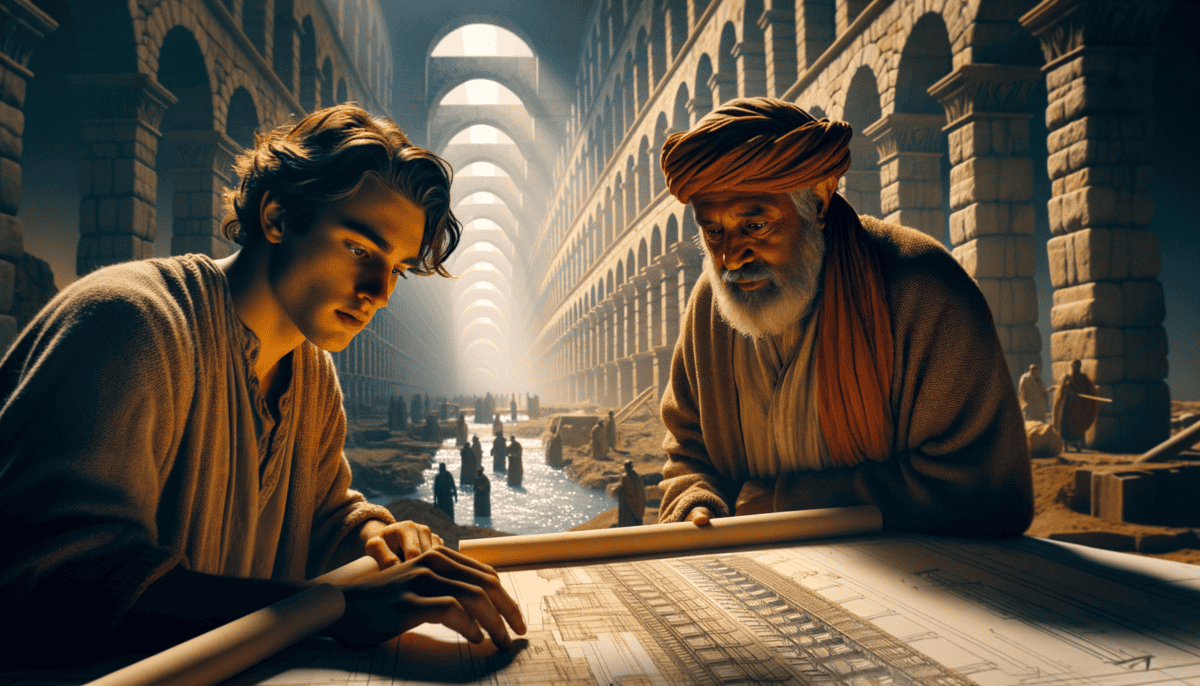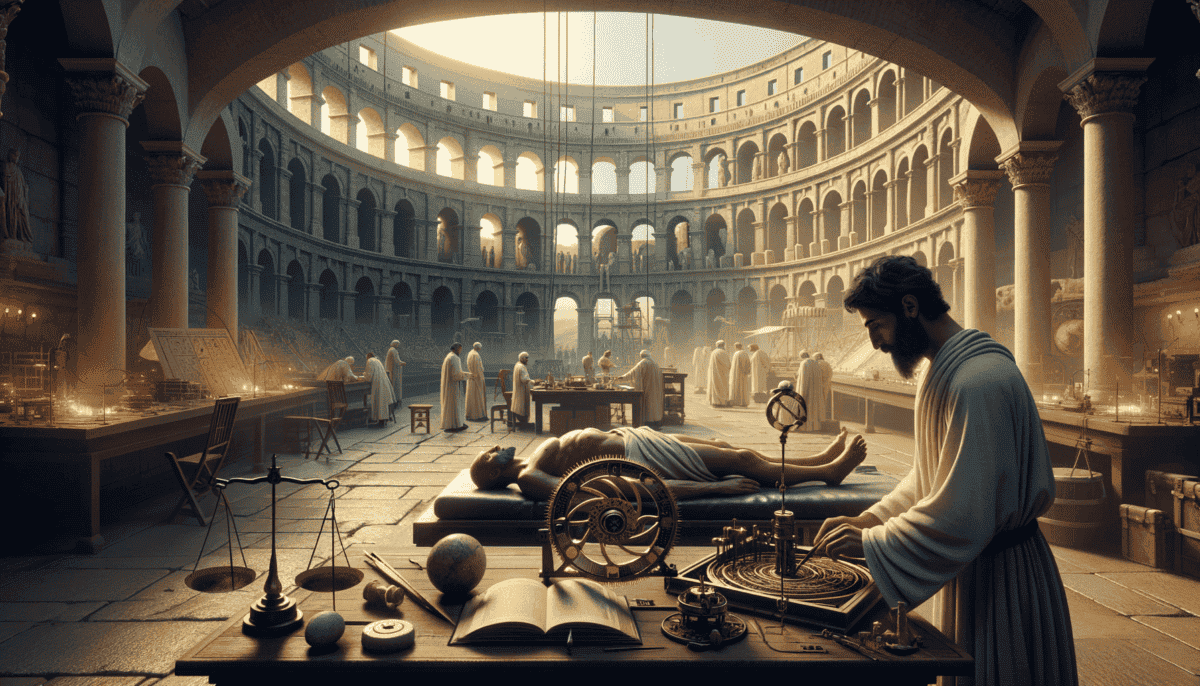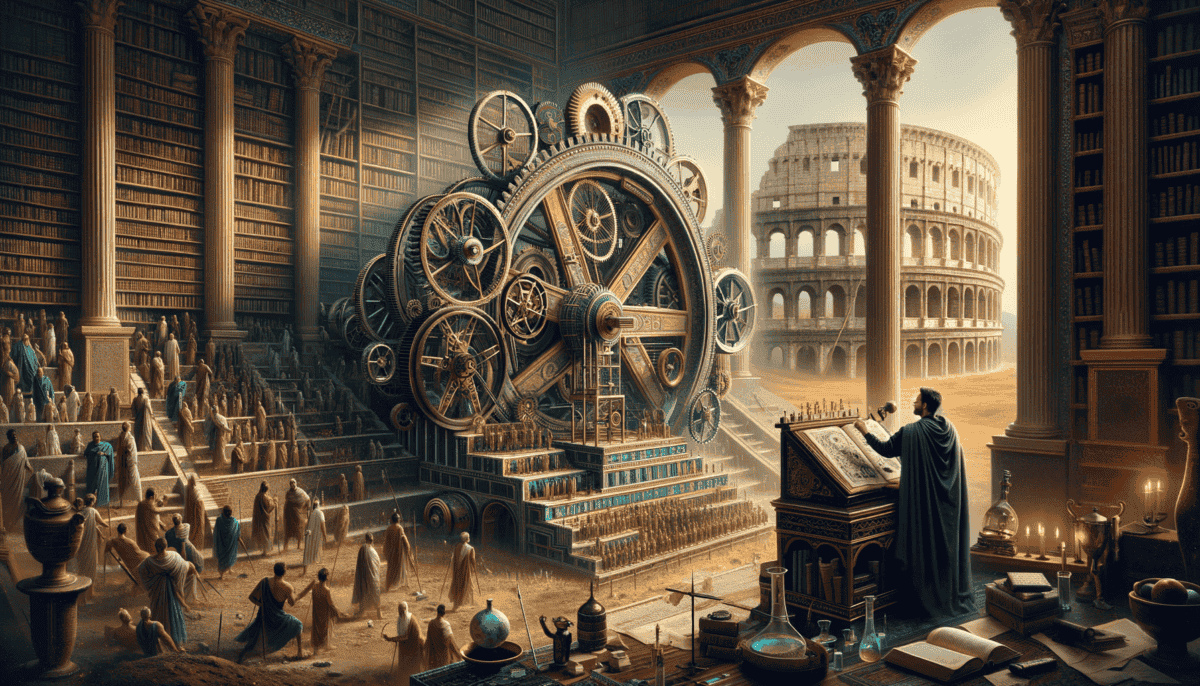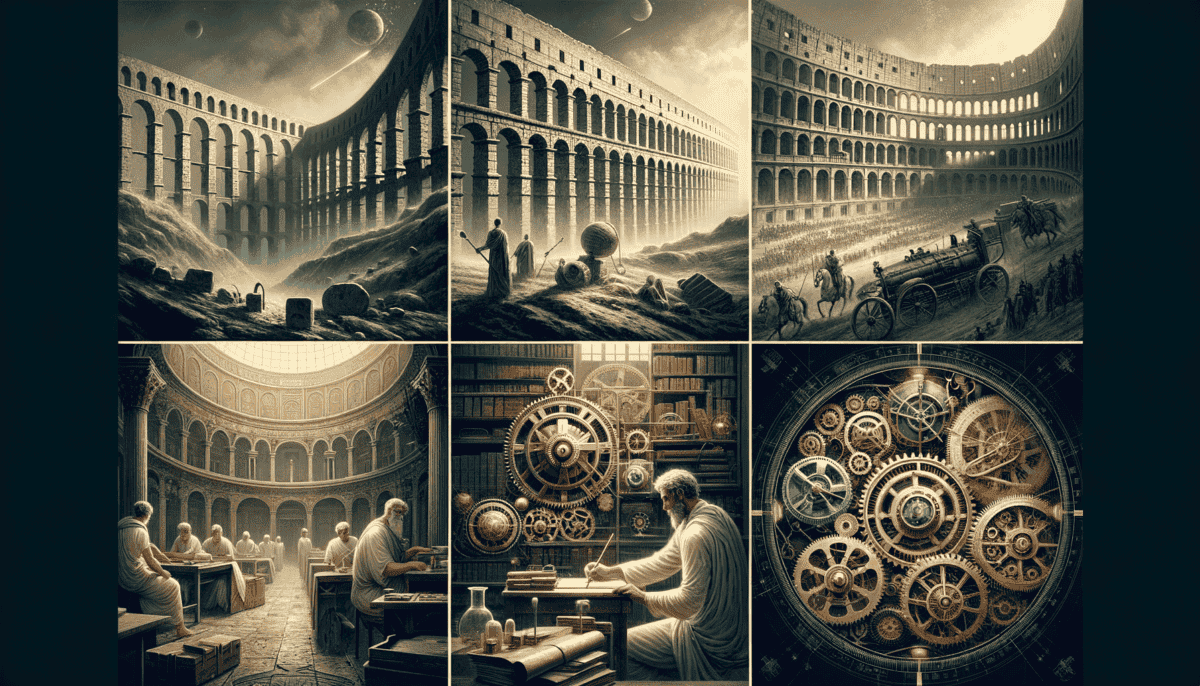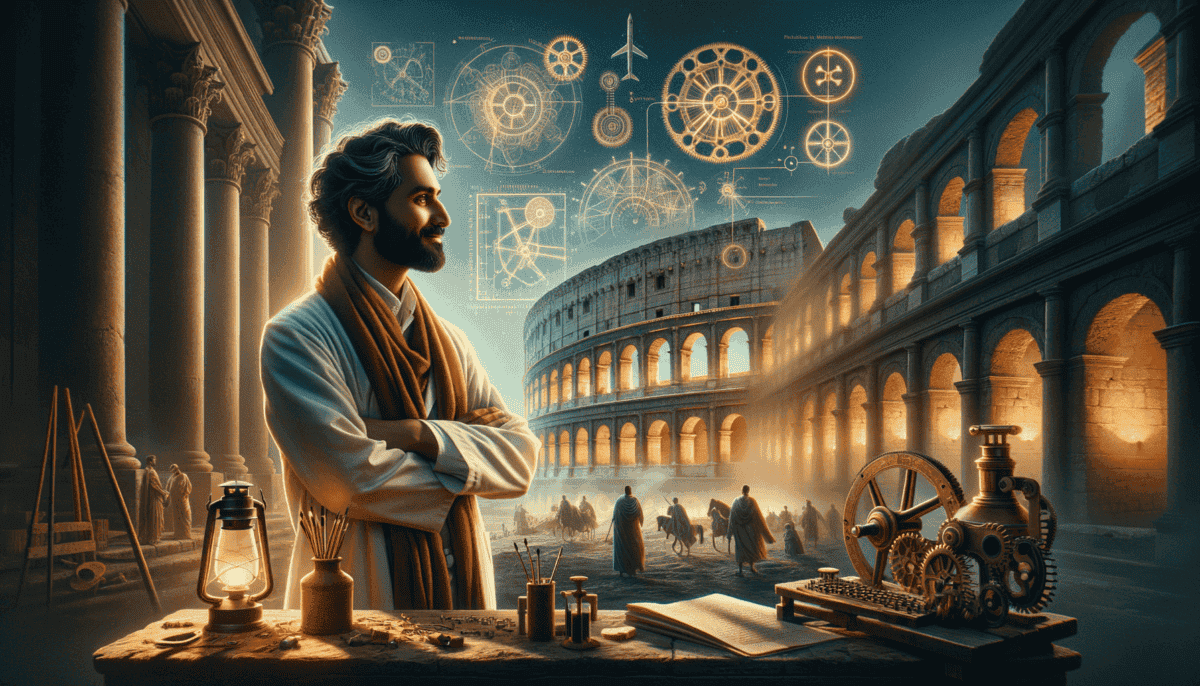Dreams of Rome
Marcus wiped sweat from his forehead as he watched workers build another tall building in Rome. The summer sun was hot, but his eyes sparkled with excitement. At twelve years old, he loved watching the city grow.
"Papa, how do they make the buildings so tall?" Marcus asked, tugging on his father's toga.
His father, Quintus, smiled. He was one of Rome's best builders. "Roman builders are very clever, my son. We use special tools and strong materials."
Marcus picked up a chunk of gray stone from the ground. It wasn't just any stone – it was Roman concrete. ️
"This is what makes our buildings special," Quintus explained. "Our concrete is stronger than regular stone. It's a secret recipe that makes Rome great!"
The boy watched as workers used different tools. They had long measuring sticks called rules and L-shaped tools called squares. These helped make sure walls were straight and corners were perfect.
"Can I learn to use those tools?" Marcus asked hopefully.
"Of course! But first, you need to learn about numbers and shapes," his father replied. "Every great builder starts as a student."
That night, Marcus couldn't sleep. He sat by his window, looking at the stars. The moon was bright, lighting up his collection of small wooden models. He had built tiny versions of temples and bridges.
"One day," he whispered to himself, "I'll build something amazing that all of Rome will remember!"
“Great builders see with their minds before they build with their hands.” – Marcus’s father always said this.
The next morning, Marcus woke up early. He had a special plan. He would visit all the building sites in Rome to learn about different tools. His father's friend, Lucius, was working on a new aqueduct.
"Ah, young Marcus!" Lucius called out when he saw the boy. "Come to see our water bridge?"
Marcus nodded eagerly. Lucius showed him a bronze tool called a libra – a level that helped keep the water flowing just right.
"Water is tricky," Lucius explained. "It needs to flow downhill very slowly. If we make a mistake, the whole aqueduct won't work!"
Marcus's eyes grew wide. "How do you know if it's right?"
Lucius handed him the level. "Here, try it yourself."
Marcus carefully placed the tool on a stone block. A small bubble in the middle showed if it was perfectly flat. His hands shook a little, but he managed to use it correctly.
"Well done!" Lucius praised. "You have good hands for tools. Maybe you'll be an engineer one day!"
On his way home, Marcus couldn't stop smiling. He had learned about:
• Water levels for aqueducts
• Measuring tools for buildings
• Special Roman concrete
• Square tools for perfect corners
• Rules for straight lines
That evening, Marcus drew pictures of all the tools he had seen. His mother, Claudia, watched him with pride.
"Your father was just like you at your age," she said softly. "Always drawing, always asking questions."
Marcus looked up. "Really?"
"Yes. And now he builds some of the finest buildings in Rome. Keep learning, my curious boy. Rome needs young minds like yours."
As Marcus went to bed that night, he held his wooden model of an aqueduct. Tomorrow would bring new tools to discover and more secrets of Roman engineering to learn. But for now, he was happy knowing he had taken his first steps toward becoming a real Roman builder.
The Master’s Workshop
The morning sun peeked through the workshop windows as Marcus stood nervously before Master Flavius, Rome’s most famous engineer. His father had arranged this special apprenticeship, and Marcus couldn’t stop his hands from shaking.
“So, you want to learn the secrets of Roman engineering?” Master Flavius asked, his eyes twinkling.
“Yes, Master! More than anything!” Marcus replied eagerly.
Master Flavius picked up a strange-looking tool. “Do you know what this is?”
“No, Master,” Marcus admitted.
“This is a groma. We use it to make straight lines when building roads and aqueducts. Watch carefully.” ️
The master demonstrated how the tool worked. It had long arms that hung down with weights. When the weights lined up, the line was perfectly straight!
“A builder without tools is like a bird without wings.” – Master Flavius
Next, they went outside to a small test area. Master Flavius was building a mini aqueduct to teach his students.
“Here’s your first task,” he said. “Mix the concrete.”
Marcus learned the special recipe:
• Volcanic ash
• Lime
• Small rocks
• Water
• Secret ingredients Master Flavius wouldn’t share yet!
“Why do we use volcanic ash?” Marcus asked while mixing.
“Ah, that’s what makes our concrete special! It makes the concrete stronger, especially in water.” Master Flavius smiled. “Our buildings will stand for thousands of years!”
As the day went on, Marcus learned more amazing things. He discovered how to use a water level to make sure aqueducts flowed perfectly. He practiced with the groma until his lines were straight.
“You have good hands,” Master Flavius said. “But remember – a true engineer must also have a good mind. You must think about problems before you try to fix them.”
At lunchtime, other students joined them. They were all older than Marcus, but they welcomed him kindly.
“I remember my first day,” said Lucius, a teenage apprentice. “I was so scared I dropped the measuring stick three times!”
Everyone laughed, and Marcus felt better. He wasn’t the only one who had to learn.
After lunch, Master Flavius showed them something special – a model of a new bridge he was designing.
“See how the arch works?” he explained. “The shape makes it strong. Each stone helps hold up the others.”
Marcus touched the model carefully. “It’s like a puzzle where all the pieces work together!”
“Exactly!” Master Flavius clapped his hands. “You’re starting to think like an engineer!”
As the sun began to set, Marcus didn’t want to leave. His head was full of new ideas and questions.
“Tomorrow,” Master Flavius said, “we’ll learn about lifting machines. Big buildings need big tools!”
Walking home, Marcus saw the city differently. Every building, every road, every bridge had secrets he was beginning to understand. He couldn’t wait to learn more.
That night, he drew pictures of everything he’d learned. His mother smiled when she saw his dirty hands and happy face.
“Those hands look like a true builder’s now,” she said proudly.
Marcus grinned. “Master Flavius says I have good hands for tools. And tomorrow we learn about lifting machines!”
As he fell asleep, Marcus dreamed of tall buildings and clever machines. In his dream, he was building something amazing – something that would make Rome even greater. But that dream would have to wait for another day of learning with Master Flavius.
The Healing Arts
Marcus was walking home from Master Flavius’s workshop when he heard a cry for help. Near the city wall, a soldier sat clutching his leg. ♂️
“Are you okay?” Marcus rushed over.
“Training accident,” the soldier grimaced. “I’m Gaius. I need to get to the healing house.”
Marcus helped Gaius walk to the healing house. Inside, he saw amazing things he’d never seen before!
Doctor Julia was using shiny metal tools. “Welcome, young one. Would you like to learn while I help our brave soldier?”
“Yes, please!” Marcus watched closely.
“These are my special tools,” she explained. “See this one? It’s called a specillum. We use it to check wounds.”
“The best medicine starts with the right tools.” – Doctor Julia
Doctor Julia showed Marcus her healing tools:
• Bronze and silver probes
• Special scissors for bandages
• Smooth spoons for medicine
• Small hooks for cleaning wounds
• Shiny mirrors to see better
“Why are your tools so shiny?” Marcus asked.
“We keep them clean with hot water and special oils. Clean tools help people heal better!” Doctor Julia smiled.
While she worked on Gaius’s leg, she told Marcus about Galen, a famous Roman doctor. “He learned how our bodies work by studying carefully. He wrote many books about healing.”
“Does it hurt?” Marcus asked Gaius.
“Less than before,” Gaius replied. “Roman medicine is the best in the world!”
Doctor Julia showed Marcus how she wrapped bandages. “We soak them in honey sometimes. It helps fights bad things that make people sick.”
“Like Master Flavius’s special concrete recipe!” Marcus said excitedly.
“Exactly! Everything needs the right ingredients to work well.”
Another doctor came in carrying herbs. “These are for pain,” he explained to Marcus. “Different plants help in different ways.”
Marcus sniffed the herbs carefully. Some smelled sweet, others sharp and strong.
“Would you like to help me mix medicine?” Doctor Julia asked.
Marcus nodded eagerly. She showed him how to crush herbs and mix them with oil. The smell filled the room.
“This is just like mixing concrete,” Marcus said proudly. “You have to get everything just right!”
Gaius laughed. “You’re learning from everyone, aren’t you?”
As the day went on, more people came for help. Marcus watched Doctor Julia use different tools for each person.
“Remember,” she said, “healing tools are like your builder’s tools. Each one has a special job.”
When it was time to go home, Doctor Julia gave Marcus a small bottle. “This is healing oil we made together. Keep it for scrapes and cuts.”
“Thank you!” Marcus held the bottle carefully. “Can I come back tomorrow?”
“Of course! There’s always more to learn about healing.”
Walking home, Marcus thought about all the different tools he’d seen. Building tools, measuring tools, and now healing tools! Each one helped make Rome better in its own way.
That night, he added healing tools to his drawings. His father looked at the pictures with interest.
“You’re learning that Rome needs all kinds of tools to be great,” his father said. “Engineers build the city, but healers keep the people strong.”
Marcus smiled, excited about what new tools he might discover tomorrow.
Stargazing Secrets
Marcus couldn’t sleep. The full moon shone bright through his window. He remembered something Doctor Julia said about the moon helping her know when to pick special healing plants.
“Why are you still awake?” his father asked, entering the room.
“I’m watching the moon, father. How do we know when it will be full again?”
His father smiled. “I have something to show you tomorrow.”
In the morning, Marcus’s father took him to see his friend Claudius, who studied the stars. In Claudius’s workshop sat the most amazing thing Marcus had ever seen! ⭐
“What is it?” Marcus gasped, looking at the bronze device with many wheels and dials.
“This is the Antikythera Mechanism,” Claudius said proudly. “It helps us track the sun, moon, and stars.”
Marcus watched as Claudius turned a handle. The wheels inside moved together like a dance.
“The stars tell us when to plant crops and when to sail ships.” – Claudius
The device had special parts:
• Shiny bronze gears
• Round dials with numbers
• Pointers like clock hands
• Special marks for the sun and moon
• Little windows showing different months
“Can I try?” Marcus asked excitedly.
“Careful now,” Claudius guided Marcus’s hand to the handle. “Turn it slowly.”
As Marcus turned the handle, he saw the moon pointer move. “It’s like the real moon in the sky!”
“How does it work?” Marcus asked.
“Each gear has special teeth,” Claudius explained. “When they turn together, they show us where the sun and moon will be.”
“Like how my building blocks work together!” Marcus said.
“Yes! And look here,” Claudius pointed to marks on a dial. “These tell us when the moon will be full, just like you wanted to know!”
Marcus spent hours watching the device move. He drew pictures of the gears in his notebook.
“The moon takes about 29 days to go from full to full again,” Claudius taught him.
“That’s why Doctor Julia checks her moon calendar!” Marcus realized.
Later, Claudius took them to his roof. He had tools for watching the stars:
“This is a gnomon,” he showed Marcus a tall stick. “Its shadow tells us the time of day.”
“And this is an astrolabe,” he held up a flat metal disc. “It helps us find our way using stars.”
“The stars are like a map in the sky,” Marcus said, looking up.
“Smart boy! That’s exactly right,” Claudius smiled.
That evening, Marcus drew more pictures in his notebook. He drew the Antikythera Mechanism, the gnomon, and the astrolabe.
“Everything is connected,” he told his father. “Doctor Julia uses the moon for healing, and Claudius’s tools show us when the moon will be full!”
“And what do you think about that?” his father asked.
“I think Roman tools are amazing! They help us build things, heal people, and even understand the sky!”
As Marcus got ready for bed, he looked out his window again. Now he knew why the moon changed and how to predict it. He felt like he was starting to understand Rome’s biggest secrets.
The stars twinkled above as he fell asleep, dreaming of spinning gears and turning wheels that could tell the future in the sky.
Tools of War and Peace
Marcus woke up early, excited about his visit to the Roman army camp. His father had arranged for him to meet Lucius, a famous military engineer.
“Welcome, young inventor!” Lucius greeted them at the camp gates. “I hear you’re interested in our tools.”
“Is that a catapult?” Marcus pointed to a huge wooden machine.
“Yes! The onager,” Lucius smiled. “Want to see how it works?”
Marcus watched as soldiers loaded the machine. With a loud WHOOSH, it threw a heavy rock far into the air!
“Our tools help keep Rome safe. But they also build bridges and roads for people to use.” – Lucius
Lucius showed Marcus the important military tools:
• The ballista (like a giant crossbow)
• The scorpio (a smaller shooting machine)
• The corvus (a bridge for ships)
• The testudo (a big shield for groups)
• Special measuring tools for building walls
“Look at this,” Lucius held up a bronze tool. “This is a dioptra.”
“What does it do?” Marcus asked.
“It helps us build straight walls and dig tunnels. Watch!” Lucius pointed it at a distant hill.
“Can I try?” Marcus held the tool carefully.
“See that tower?” Lucius guided him. “Look through here and turn this wheel.”
Marcus saw how the tool could measure heights and distances. “This is like Claudius’s star tools!”
“Smart observation! We use many of the same ideas.”
Next, they visited the workshop where soldiers fixed their tools. Marcus saw hammers, chisels, and special measuring sticks.
“Our tools must be exact,” Lucius explained. “One small mistake could make a bridge fall!”
Marcus thought about Doctor Julia’s careful measurements and Claudius’s precise star tools. “Everything has to be just right!”
“You’re learning fast,” Lucius smiled. “Want to help me design something?”
Marcus’s eyes lit up. Together, they drew plans for a new kind of lifting machine. Marcus used what he learned about gears from the Antikythera Mechanism.
“Your idea could make our work easier,” Lucius said, studying Marcus’s drawing.
“I used ideas from everything I learned,” Marcus explained proudly. “The gears from the star calculator, the careful measuring like Doctor Julia, and the strong materials like in the aqueducts!”
Before leaving, Lucius gave Marcus a small bronze compass. “For a future engineer,” he said.
That night, Marcus added new drawings to his notebook. He wrote about how Roman tools could both protect and build.
“Father,” he said during dinner, “I think I understand now. Our tools aren’t just for one thing. They help us do many important jobs!”
“And what’s the most important job?” his father asked.
“Making life better for everyone in Rome!” Marcus answered confidently. ⚔️
As Marcus played with his new compass before bed, he thought about all the amazing tools he had seen. Each one solved a problem in a clever way. He wondered what new tools Rome would need next – and if he might help create them.
A Young Inventor’s Triumph
The big day had finally arrived! Marcus stood nervously in front of the Roman Senate building. His father squeezed his shoulder gently. ️
“Ready to show them what you’ve learned?” his father asked.
“I think so,” Marcus clutched his notebook tightly. Inside were all his drawings and ideas from his amazing journey.
The Senate hall was huge. Marcus saw his teachers sitting in the front row – Doctor Julia, Claudius, and Lucius all smiled encouragingly.
“Young Marcus,” Senator Flavius spoke, “show us what you’ve discovered about Rome’s tools.”
Taking a deep breath, Marcus opened his notebook. “I learned that Roman tools are special because they work together!”
He held up his diagrams showing how the same measuring ideas helped build aqueducts AND heal people:
“The careful measuring Doctor Julia uses for medicine is just like what we use to build straight aqueducts!” Marcus explained excitedly.
The senators leaned forward, interested. Marcus grew more confident.
“And look at this!” He showed them his design combining ideas from the Antikythera Mechanism with military tools. “We can use star-counting gears to make better lifting machines!”
Senator Flavius nodded approvingly. “Tell us, what was your most important discovery?”
“That Roman tools do more than one job,” Marcus answered proudly. “They help us learn, build, heal, and protect. And when we combine their best parts, we can make even better tools!” ⚡
The hall erupted in applause. Doctor Julia beamed. Claudius gave him a thumbs up. Lucius nodded proudly.
“Young man,” Senator Flavius stood, “you have shown wisdom beyond your years. Rome’s future is bright with young minds like yours.”
Marcus’s father hugged him tight. “I’m so proud of you, son.”
Later that evening, Marcus’s family hosted a celebration. All his teachers came to congratulate him.
“What will you invent next?” Doctor Julia asked with a smile.
Marcus pulled out his notebook, showing fresh blank pages. “I have so many ideas! Maybe a new medical tool that uses stars to help healing. Or a building machine that works like the Antikythera Mechanism!”
That night, Marcus stood on his balcony looking at the stars. His bronze compass glinted in the moonlight. The same stars that guided ships helped doctors heal and engineers build. Everything was connected!
He thought about his journey – from curious boy to young inventor. He had learned that Rome’s greatest strength wasn’t just its tools, but how people used them together to solve problems.
Opening his notebook to a fresh page, Marcus began to draw. He had many new adventures ahead, and Rome’s tools would help him make his dreams come true.
As the moon rose over the eternal city, Marcus smiled. The legacy of Roman innovation would live on through him and other young inventors, making the world better, one clever tool at a time.


